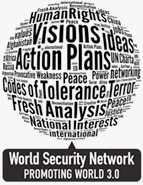Understanding Our Enemies
The sixth century before the Common Era Chinese philosopher-general Sun Tzu, author of The Art of War, emphasized the importance of understanding one's enemy. That is a rule of warfare that we ignore at great peril to our success and ultimately to the preservation of our freedom. In our ongoing war with Islamic radical fundamentalism, it appears that our political leadership fails to grasp the significance of the ideology of both Sunni and Shiite radical fundamentalists. Our ability to defeat al-Qaeda and other Sunni radicals, as well as to defeat th

e Shiite Islamic Republic of Iran (both groups being at war with the United States and the West in general) will remain seriously compromised until we understand well what drives them and what it is that they ultimately wish to accomplish.
At one level, the job of comprehending radical Islam is not difficult at all. This task is simple because the Islamists are very vocal about what they want to accomplish, which is the establishment of a Moslem caliphate or universal Moslem empire. Much more difficult is the mission of causing our leaders to confront the threats and to deal properly with them. One thing should be most clear to all by now: given the opportunity, the Islamist radical will do his utmost to impose his will upon the world, whether or not we are willing to submit.
Unfortunately, too many of our leaders believe that everything has a price-tag attached to it, and if one can only discover what that price is, it is possible to negotiate, barter, or pay, and thus solve the problem. Since this market-place strategy operates well within Western political systems, it is assumed that it can be just as efficient when used in dealing with Islamic radicals. However, the Islamist radical is a "true believer" whose beliefs and convictions are not for sale. He/she is willing to die for his/her beliefs, and so market-place strategies have no influence upon him/her. The only price that the Islamist is willing to accept is our surrender or capitulation; that price-tag is too high to pay for anyone who treasures freedom.
To date, too few Western leaders have taken Iranian leaders like Mahmoud Ahmadinejad or Ali Khamenei at their word when they say that Israel must disappear from the map and/or the pages of history. And while it is doubtful that Iran has plans to implement the immediate fulfillment of its anti-Israel campaign, there should be little question that the current Iranian government is attempting to establish its hegemony over the region and sees Israel as well as the United States as an impediment that needs to be removed in order to establish that hegemony. The recent visit of Ahmadinejad to Lebanon, and to south Lebanon in particular, should serve to awaken our leaders to the fact that Iran is extending its influence and drawing more nations into its anti-Western axis.
The Islamic Republic of Iran (IRI) has consistently used the same tactics for thirty years: it has employed proxies to do its biding. Whether one is considering Hamas, Hizballah, Jihad Islami, al-Qaeda, or the Taliban, it is the IRI that has trained, supplied, and aided both Sunni and Shiite jihadists in its ongoing thirty-plus year war with the West, and continues to do so.
It should not be naively assumed that the Islamist attack against the West will end should the State of Israel disappear from the map. The Islamists' desire to impose shari'ah law is not limited to the Dar al-Islam (Islamic world); it is a step in the program of converting the Dar al-Harb (the non-Islamic world) and absorbing it into the Dar al-Islam. Islamists increasingly are moving into an aggressive mode in their belief that they are succeeding in their quest. We in the West need to step out of our own egocentric weltanschauung and begin to comprehend the mindset of the Islamist. Until we comprehend his thinking, we cannot succeed in planning adequately to countermand his plans and objectives.
One of the first things that we need to understand about the Islamist is his sense of history and the direction of its tide. The Islamist believes that history ultimately is on his side; he believes that Islam will eventually prevail and conquer the globe. Total success may require centuries, but he is convinced that Islam is winning. And in terms of sheer numbers of adherents, the Islamist has reason to believe as he does. While western European countries continue to welcome large numbers of Moslem immigrants into their territory without assimilating them into their respective cultures, Islamists throughout Europe and North America have succeeded in radicalizing the mosques and Islamic education centers. When the Ikhwan (the Muslim Brotherhood)'sSupreme Guide, Muhammad Badi', can publicly call for Moslems worldwide to join a jihad against the West, we should begin to realize the size and nature of the conflict in which we are being engaged.
Nor should jihad be understood only in terms of martial actions; jihad can and does take the form of economic warfare and subterfuge. Stuart Levey, the U.S. Department of the Treasury's Under Secretary for Terrorism and Financial Intelligence, has led a brilliant campaign to counteract the Islamists' jihad against the United States, but his work and that of his fellows at Treasury have been isolated examples of the necessary effort that must be expended in order to defeat our enemies. Too many staffers at the State Department and too many advisors in Congress and the White House are woefully ignorant of the threats from radical Islam—whether it is in the form of sleeper cells of al-Qaeda or from agents of the IRI and its allies and proxies. So too, our intelligence agencies need to be more aggressive in determining changing patterns and alliances in the Moslem world. The radical change of direction of Turkey under Prime Minister Recep Tayyip Erdogan and the AKP, and its alliances with Iran and Syria are examples of situations that need to be anticipated and assessed in a more timely manner, allowing us to protect our intelligence and that of our key allies. Turkey's drift into the Islamist camp has not occurred overnight—it has been occurring in incremental steps over most of the last eight years since the AKP came to power. Yet, it appears that our government has been taken by surprise by these changes, and others, and been slow to adjust to them.
In summation, Sun Tzu's sage advice becomes imperative for us if we are to win the war with radical Islam. Our enemies are "in for the long haul"; we had better realize that we too, need to be prepared and dedicated to winning this war—however long it takes—and winning it decisively.








Comments